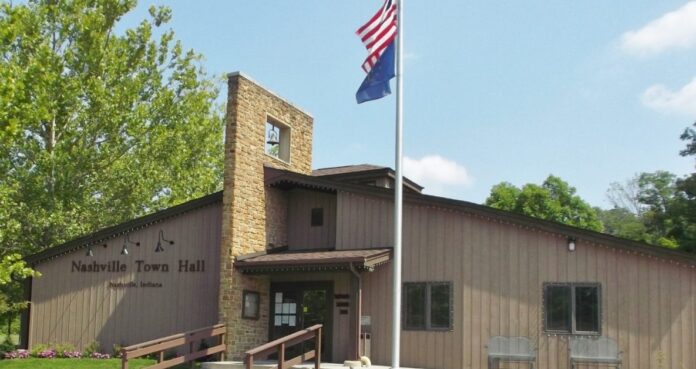In an “abbreviated” meeting this afternoon, the Nashville Town Council discussed for nearly an hour and a half what policies it should be putting into place regarding the COVID-19 pandemic. Members also heard from the county’s emergency management director about what was going on in the broader Brown County community to provide aid and information.
The council approved:
- A proclamation that declares a local disaster.
- An ordinance that declares an emergency and gives the town council president (Jane Gore) the authority to prohibit or restrict the use and/or occupancy of all facilities and public properties the town owns; and “order any reasonable rules regarding the town’s employees, its assets and the public needed for the protection of such persons and assets.” Actions taken under this ordinance are “to protect the public safety, health and welfare of the town and its people, the public, its properties and all other assets,” it reads.
- A measure to pay town employees for two weeks even if they would not be able to come in to work. That time frame could be extended with the consent of the town council.
- A mandate that any town employee returning from a Level 2 or 3 area, or coming into contact with a person with a confirmed case of COVID-19, must take a 14-day sick leave. That time will not be deducted from their maximum 360 hours of paid sick leave. So far, this only affects Utility Coordinator Sean Cassiday, who has just returned from Ireland, council members said. However, other town employees are traveling during spring break and are not yet back.
- A waiver of Nashville Utilities disconnect fees and late fees for March for water and sewer bills that would come out in April, as people face loss of income and might have to start making hard choices on what to pay. “As bad as we (the town) need that money, I … felt like it was something we needed to do,” Gore said.
- Keeping all of the town’s public restrooms open for the time being. Council members Nancy Crocker and Anna Hofstetter wanted to see either some restrooms be closed or all three of them closed to reduce the risk of virus transmission, but Gore and council member David Rudd supported keeping them open to not make it seem like Nashville’s business community was closed. If Gore decides, by executive order, to close any of the public restrooms, that will be an opportunity for the contracted restroom cleaner to do a “deep clean” of those buildings, council members said.
- Posting the town’s public WiFi password on the door of Town Hall so that people can use the internet from their cars in the parking lot if they need to.
- Street closures for the May 2 Spring Blossom Parade and the Rotary Kids Games — though council members acknowledged that those events might not actually happen. It would be up to the organizers to cancel them or not, though.
Town Hall continues to be closed to the public, but it was open for a brief time for this meeting. Town leaders are working on a webcasting system to allow the public to observe and participate in future meetings. The Brown County Democrat will assist in distributing that web link to viewers when it’s ready.
Brown County EMA Director Susan Armstrong also gave the council an overview of the Brown County COAD group, or Community Organizations Active in a Disaster. Two town council members, Gore and Crocker, are involved in that group and its many task forces, studying evolving issues like local employment during the virus, the care of children and seniors, housing and utilities assistance, and other topics.
Armstrong encouraged the community to tap into the group’s Facebook page to get answers to the questions you may have about how the pandemic affects you.





